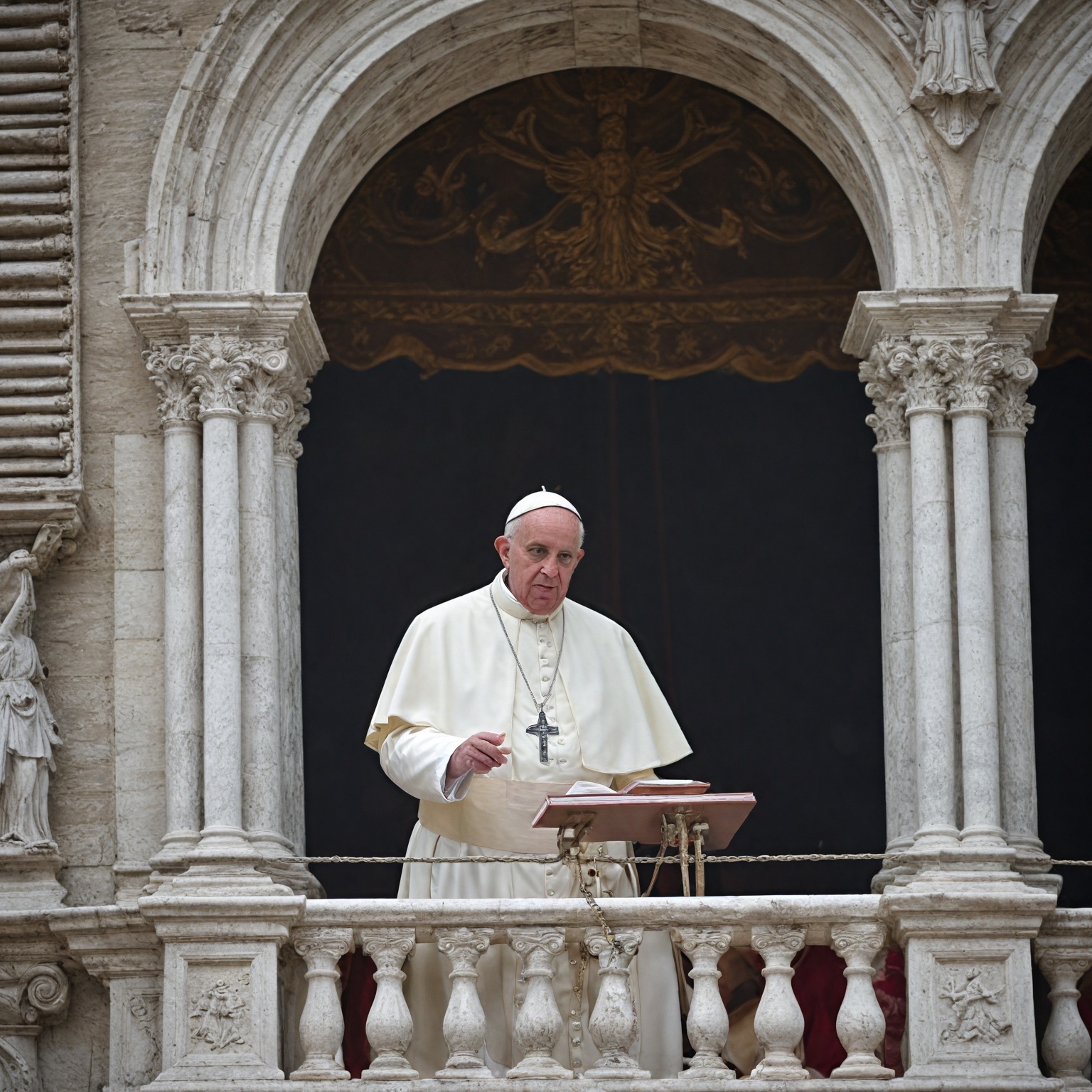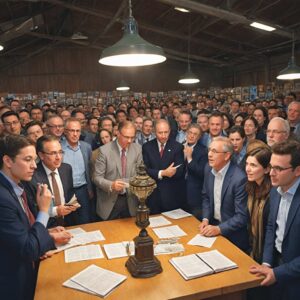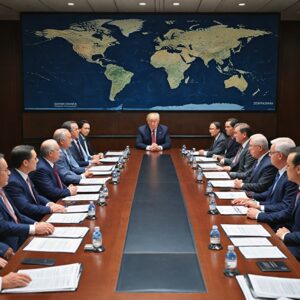Summary
Pope Leo XIV, elected in May 2025 as the 267th pope and the first North American to hold the position, delivered a powerful debut Sunday address calling for global peace and unity. Born Robert Francis Prevost in Chicago and with deep pastoral experience in Peru, Leo XIV’s election marked a significant moment in the Catholic Church’s ongoing globalization and engagement with contemporary global challenges. His inaugural speech, delivered from the balcony of St. Peter’s Basilica, emphasized peace as an unarmed, humble, and persevering gift rooted in the risen Christ’s message, setting a hopeful tone for his pontificate.
Building on the legacy of his namesake Pope Leo XIII and predecessors like John Paul II and John XXIII, Leo XIV underscored continuity with Catholic social teaching while addressing urgent issues such as digital transformation, migration, climate change, and social justice. His homily lamented the global loss of religious faith linked to violations of human dignity and reaffirmed a commitment to marginalized communities, echoing the pastoral outreach initiated by Pope Francis. Notably, Leo XIV’s early openness with the press and faithful signaled a new approach to papal communication and transparency.
The pope’s address and subsequent public statements sparked widespread attention, resonating with those seeking dialogue amid political polarization and social division. While praised for his advocacy on racial justice and public health, including support for vaccination efforts and the Black Lives Matter movement, Leo XIV’s earlier remarks on certain social issues—such as his 2012 comments on homosexuality—raised questions about how his papacy might navigate evolving Church teachings on LGBTQ+ matters. His unique position as the first U.S.-born pope has further shaped perceptions of his leadership and priorities in a global religious context traditionally dominated by Europeans.
Leo XIV’s inaugural appeal for peace and justice reflects a papacy intent on bridging tradition with modern realities, fostering reconciliation in a fractured world. His legacy remains in formation, with his ability to enact meaningful reform and sustain moral leadership central to the Church’s future trajectory.
Background
The papacy has historically played a significant role in shaping global history, often expanding its influence during periods of political and social upheaval. For instance, the authority of the Pope increased notably during the decline of the Western Roman Empire in the 5th century, exemplified by Pope Leo I’s meeting with Attila the Hun in 452 A.D., an event that underscored the papacy’s diplomatic clout and moral authority. Over the centuries, popes have wielded varying degrees of temporal power, using their spiritual and political influence to address worldwide issues and mediate conflicts.
Pope Leo XIV, elected in May 2025 as the 267th pope and the first North American to hold the position, continues this legacy of engaging with pressing global challenges. Born Robert Francis Prevost in Chicago, he holds dual Peruvian-American nationality and has spent much of his ecclesiastical career serving in Peru and at the Vatican. His election marks a significant moment in the Church’s globalization, following Pope Francis, the first Latin American pope. Prevost’s background includes two decades of leadership in Peru, culminating in a prominent Vatican role advising on episcopal appointments, positioning him as a bridge between tradition and modernity within the Church.
Leo XIV’s papacy draws inspiration from his namesakes, especially Leo XIII, emphasizing the continuation of Catholic social teaching and Augustinian communal spirituality. His agenda addresses contemporary challenges such as digital transformation, migratory movements, and climate change, positioning the Church as a mediator in a polarized world. His first public address from the balcony of St. Peter’s Basilica notably focused on peace, echoing his predecessors’ roles in international diplomacy and moral leadership. This historic election and early messaging signal the pope’s commitment to fostering dialogue and reconciliation amid global tensions.
The Debut Sunday Address
Pope Leo XIV delivered his inaugural Sunday address from the central balcony of St. Peter’s Basilica, marking a significant moment early in his pontificate. Building on the themes introduced in his first speech the previous evening, the Pope emphasized peace as the cornerstone of his papal mission, invoking the greeting of the risen Christ: “Peace be with you.” He described this peace as unarmed, disarming, humble, and persevering—an enduring gift from God who loves all people unconditionally.
In his homily during the Mass preceding the address, Pope Leo XIV reflected on the teachings of his predecessor, Pope Francis, lamenting the loss of religious faith that he linked to numerous “appalling violations of human dignity” worldwide. His message underscored continuity with Francis’s pastoral outreach and commitment to social justice, particularly for marginalized communities. Leo XIV expressed gratitude to the cardinals who elected him, pledging to lead a united Church that faithfully proclaims the Gospel without fear and works collaboratively toward peace and justice.
The Pope’s address also carried echoes of past pontiffs, notably the call to be “without fear” reminiscent of John Paul II’s 1978 inauguration and the pastoral warmth akin to John XXIII’s “moonlight speech.” These references highlighted Leo XIV’s intent to blend tradition with a forward-looking global outreach. Identifying himself as a son of Saint Augustine and a member of the Augustinian order, he framed his papacy as a journey taken in unity with the Church and its faithful.
Significantly, Leo XIV’s public interaction with the press and faithful so soon after his election was unprecedented, signaling a new openness in papal communications. His message from the balcony not only reaffirmed the Church’s mission but also set a hopeful tone for his tenure: fostering peace, justice, and a fearless proclamation of the Gospel in a complex and divided world.
Reception and Impact
Pope Leo XIV’s debut Sunday address was met with widespread attention and sparked considerable discussion both within and beyond the Catholic community. His call for global peace and unity resonated with many who viewed it as a timely and heartfelt appeal amid ongoing international conflicts and social divisions. The pope’s message, urging people to embrace dialogue, encounter, and solidarity, echoed longstanding themes of previous pontificates while also reflecting contemporary concerns.
Critics and supporters alike noted the pope’s emphasis on confronting modern challenges such as racial injustice, public health, and political polarization. Leo XIV’s vocal support for vaccination campaigns during the COVID-19 pandemic and his denunciation of racism, as expressed on his X social media account, underscored his commitment to addressing pressing societal issues. His advocacy for justice and rejection of discrimination gained particular traction following his public endorsement of the Black Lives Matter movement.
However, some observers highlighted potential tensions in Leo XIV’s approach, especially regarding his earlier remarks on Western values and their relationship to certain social issues. For instance, his 2012 comments on homosexuality, which described some Western attitudes as conflicting with gospel teachings, raised questions about how his papacy might navigate the evolving stance on LGBTQ+ matters within the Church. Time will tell whether his leadership will signal continuity or change compared to his predecessor Francis’s reforms.
The pope’s American background also shaped perceptions of his leadership. Being the first U.S.-born pope, Leo XIV faced scrutiny about the implications of his nationality in a global religious office historically dominated by Europeans. Some viewed his election as a breakthrough overcoming geopolitical reservations about a U.S. pontiff, while others speculated on how his cultural context might influence his priorities and outreach.
Legacy
Pope Leo XIV’s inaugural address marked a significant moment in the history of the Catholic Church, establishing a vision that bridges tradition with modern global challenges. His repeated invocation of “peace” set the tone for a pontificate deeply concerned with social justice, ecological stewardship, and human fraternity. By calling for a peace that is “unarmed and disarming, humble and persevering,” he emphasized a spirituality rooted in the peace of the risen Christ that transcends political and social divisions worldwide.
Drawing inspiration from his namesake, Pope Leo XIII, Leo XIV’s papacy is oriented toward addressing contemporary issues such as digital transformation, migration, and climate change, while extending the social teachings established by his predecessors. His leadership style reflects a continuity with Pope Francis, particularly in his commitment to the marginalized and poor, a hallmark shaped by Leo XIV’s two decades of work in one of Peru’s poorest regions. As the first U.S.-born pope, he carries a unique perspective, especially as he appeals to a world often skeptical of traditional religious values in favor of technology, wealth, and power.
Leo XIV’s legacy is still unfolding, but his initial plea for peace and global solidarity signals an intention to mediate polarized factions and promote a church that engages with modern realities while upholding enduring spiritual principles. Whether he can translate this vision into effective institutional reform and global moral leadership remains a pivotal question for the years ahead.
The content is provided by Avery Redwood, Fact-Nest













